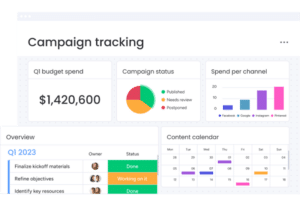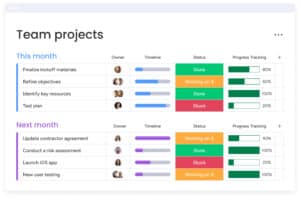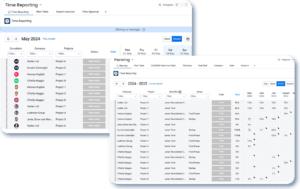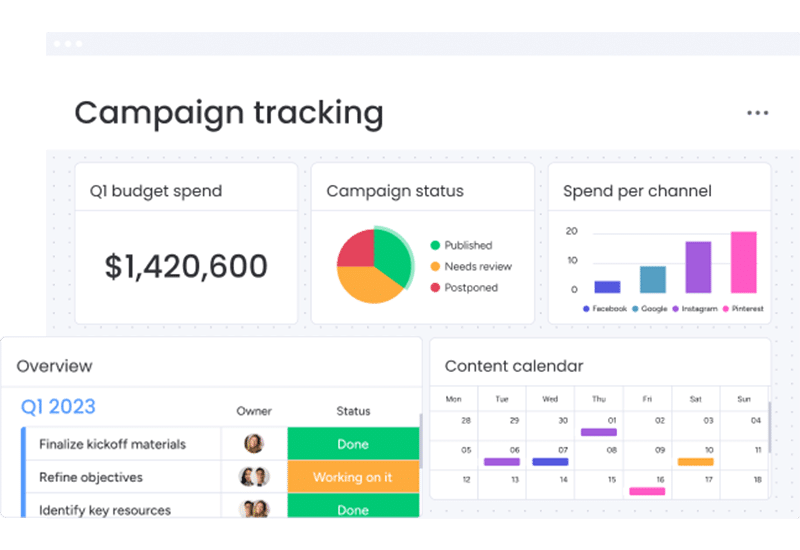Setting the Stage for AI in B2B Marketing
The business-to-business (B2B) landscape is evolving rapidly. Traditional marketing techniques are making way for more advanced, data-driven strategies. Among the most transformative forces in this shift is the rise of artificial intelligence (AI). With the emergence of AI-driven analytics, the way businesses analyze, interpret, and act upon data is experiencing a significant paradigm shift. This post aims to delve deep into the impact of AI-driven analytics in B2B marketing decisions, illustrating how this technological marvel can be a game-changer for your business.
Why AI-Driven Analytics?
Over the past few years, analytics have played a crucial role in shaping B2B marketing strategies. From customer segmentation to predictive modelling, analytics have been integral in helping businesses make informed decisions. However, the surge of AI technology has brought an advanced layer of sophistication, allowing for even more precise, efficient, and effective decision-making processes.
What You’ll Learn from This Blog
In this blog, we’ll explore what AI-driven analytics entails, why they’re essential in the current B2B marketplace, and how they’re revolutionizing various aspects of marketing decisions. Whether you’re a marketing executive, a decision-maker in a B2B setup, or simply curious about the implications of AI in business contexts, you’ll find invaluable insights on the impact of AI-driven analytics in B2B marketing decisions.
What is AI-Driven Analytics?
As we journey further into the data-centric world, it’s crucial to understand what sets AI-driven analytics apart from traditional analytics. While both serve the purpose of interpreting and leveraging data, AI-driven analytics incorporate machine learning algorithms, natural language processing, and other advanced techniques to offer far more in-depth, timely, and actionable insights. In this section, we will unravel the intricate layers of AI-driven analytics and how its growing influence has a profound impact on B2B marketing decisions.
The Core Components of AI-Driven Analytics
AI-driven analytics isn’t merely a buzzword but a confluence of various AI technologies aimed at enhancing data interpretation and utilization. At its core, AI-driven analytics may incorporate:
- Machine Learning: Enables the analytics software to learn from new data, refining its algorithms for better future predictions.
- Natural Language Processing (NLP): Allows for more intuitive data queries, often in the form of spoken or written human language.
- Predictive Modeling: Utilizes historical data to predict future outcomes, offering a foresight that’s invaluable in strategic decision-making.
Distinguishing Features: AI-Driven vs. Traditional Analytics
So, what makes AI-driven analytics so unique and indispensable, particularly when considering the impact of AI-driven analytics in B2B marketing decisions?
- Real-time Analysis: Unlike traditional analytics, which often require manual intervention for updates, AI-driven analytics can offer real-time insights.
- Personalization: With AI, it’s easier to create personalized marketing strategies that are tailored to individual customer behaviours and preferences.
- Scalability: AI-driven analytics can easily adapt to increasing amounts of data, becoming more accurate and insightful as they process more information.
By understanding the defining features and core components of AI-driven analytics, B2B marketers can more effectively grasp the tool’s immense potential and its impact on marketing decisions.
Why B2B Marketing Needs AI-Driven Analytics
B2B marketing is complex, multi-faceted, and ever-evolving. It involves nurturing long-term relationships and often has sales cycles that can extend for months or even years. Traditional analytics have offered some insights into customer behaviours and market trends, but they often fall short when it comes to real-time decision-making and personalized strategy formulation. This is where AI-driven analytics come into play, providing a groundbreaking impact on AI-driven analytics in B2B marketing decisions.
Solving Unique Challenges in B2B Marketing
One of the most compelling reasons for adopting AI-driven analytics in B2B marketing is its capability to solve unique challenges such as:
- Personalization at Scale: B2B businesses often have a broad range of clients with different needs and buying behaviours. AI-driven analytics allows for granular customer segmentation, enabling personalization at an unprecedented scale.
- Advanced Lead Scoring: Traditional lead scoring methods often rely on simplistic point-based systems. AI analytics offers a more nuanced approach by analyzing multiple data points, thereby increasing the chances of conversion.
- Optimized Customer Segmentation: AI algorithms can sift through vast amounts of data to identify common patterns or behaviours, allowing marketers to segment their customer base more effectively.
By understanding these applications, B2B marketers can better appreciate the compelling need for integrating AI-driven analytics into their marketing strategies.
Omnitas Newsletter
Sign up for our monthly newsletter to stay up-to-date on our latest blog articles, videos and events!
Thank you!
You have successfully joined our subscriber list.
How AI-Driven Analytics Influences Marketing Decisions
While we’ve established the foundational importance of AI-driven analytics in B2B marketing, it’s crucial to delve into its tactical applications. From pricing strategies to content targeting, AI-driven analytics offers an array of tools to make data-backed decisions. The breadth of its influence substantiates the growing impact of AI-driven analytics in B2B marketing decisions.
Refining Pricing Strategies
Traditional pricing strategies in B2B markets often rely on competitor analysis and historical data. While useful, these methods lack the real-time adaptive nature that AI-driven analytics offers. Through AI, pricing can be dynamically adjusted based on real-time market conditions, seasonal trends, and customer behaviour, thereby ensuring maximum profitability and market responsiveness.
Channel Optimization for Better ROI
In B2B marketing, the choice of channel can make or break a campaign. AI-driven analytics allow for a much more granular analysis of channel performance. For instance, AI can automatically allocate more resources to higher-performing channels while scaling down on those that are less effective, thus ensuring a better return on investment (ROI).
The Revolution in Customer Journey Mapping
Understanding the customer journey is vital for any B2B marketing strategy. AI-driven analytics provides an in-depth view of each touchpoint, from initial contact to the final conversion. This level of detail enables marketers to optimize each stage of the customer journey, greatly impacting the overall effectiveness of the marketing strategy.
Content Targeting Like Never Before
Content is king, but even the most exceptional content can fail if it doesn’t reach the right audience. AI-driven analytics takes the guesswork out of content targeting. By analyzing user behaviour and preferences, AI can automate the process of content delivery to specific customer segments, making each marketing campaign more impactful.
By leveraging these advanced tools and techniques, B2B marketers can elevate their decision-making processes to unprecedented levels. The integration of AI-driven analytics is not just a technological upgrade; it’s a strategic imperative for modern businesses given its impact on AI-driven analytics in B2B marketing decisions.
The Managerial Perspective
While the technical implications of AI-driven analytics are expansive and profound, the managerial implications are equally significant. Leadership teams and decision-makers need to be acutely aware of the capabilities and potential that AI-driven analytics bring to the table. Understanding the managerial impact of AI-driven analytics in B2B marketing decisions can be the key to long-term success and sustainability.
Risk Assessment and Management
One of the less-discussed yet critical areas where AI-driven analytics shines is risk assessment. Managers can leverage AI to identify and measure potential risks in real time, be it market volatility, customer churn, or even operational inefficiencies. This proactive approach to risk management can help businesses anticipate challenges and formulate strategic responses promptly.
Budget Allocation and Resource Optimization
Budgeting is always a sensitive subject in management circles. Knowing where to invest limited resources for maximum impact is a perennial challenge. AI-driven analytics provides data-backed insights that can help managers make more informed decisions on budget allocation, thereby ensuring optimal utilization of both financial and human resources.
Aligning Marketing Goals with Business Objectives
In any organization, aligning departmental goals with broader business objectives is vital for cohesive growth. AI-driven analytics offers managers a data-driven framework to assess how marketing efforts contribute to achieving business goals like revenue growth, market penetration, and customer satisfaction. Thus, the insights gleaned from AI analytics can serve as a roadmap for managerial decision-making.
Enhancing Team Collaboration and Productivity
AI-driven analytics tools often come with collaborative features that allow for seamless information sharing among team members. Managers can use these platforms to create a more cohesive work environment, fostering a culture of data-driven decision-making. The real-time nature of AI analytics also speeds up internal processes, boosting overall team productivity.
By embracing AI-driven analytics from a managerial standpoint, businesses can instigate a holistic change that benefits not just marketing departments but the organization at large. Given its transformative potential, understanding the managerial impact of AI-driven analytics in B2B marketing decisions is crucial for any forward-thinking enterprise.

Risks and Limitations
While we’ve spent significant time discussing the many advantages and the profound impact of AI-driven analytics in B2B marketing decisions, it’s essential to consider the technology’s limitations and inherent risks. Acknowledging these concerns will provide a balanced perspective, enabling managers and decision-makers to approach AI adoption with realistic expectations.
Data Privacy and Ethical Concerns
With the surge in data analytics, there are rising concerns about data privacy and ethics. AI algorithms often require large amounts of data, some of which may be sensitive or personal. There’s always a risk of data breaches or misuse, and companies must adhere strictly to privacy laws like GDPR to mitigate this risk.
Implementation Complexity
The sophistication that makes AI-driven analytics so potent also makes it complex to implement. Organizations often underestimate the time, resources, and expertise required to effectively integrate AI analytics into their existing systems. Failure to navigate this complexity can result in costly errors and diminished ROI.
Dependence on Data Quality
The efficacy of any AI-driven analytics system is directly dependent on the quality of the data fed into it. Inaccurate or incomplete data can lead to inaccurate interpretations, which in turn can severely impact marketing decisions. Hence, companies must invest in proper data cleansing and preparation before leveraging AI analytics.
The Human Element and Interpretation
AI algorithms are only as good as the human intelligence that guides them. While AI can churn out quantitative insights, the qualitative interpretation still lies in human hands. Managers should be wary of becoming overly reliant on AI-generated insights and should always use their judgment in making final decisions.
Financial Costs and ROI Considerations
AI-driven analytics platforms often come with substantial costs, not just for the software itself but also for the training and maintenance required. Businesses need to conduct a thorough ROI analysis to ensure that the benefits outweigh the financial outlays.
By acknowledging and preparing for these risks and limitations, companies can make more informed decisions when adopting AI-driven analytics. While the technology promises to bring revolutionary changes, understanding its potential downsides is vital for achieving long-term success and mitigating the risks that can impact AI-driven analytics in B2B marketing decisions.
Navigating the Future Landscape of AI-Driven Analytics in B2B Marketing
As we look ahead, the role of AI-driven analytics in shaping B2B marketing decisions is set to grow exponentially. It’s more than just a technological trend; it’s an evolutionary shift in how businesses analyze data, make decisions, and interact with their clients. Here’s a closer look at the future impact of AI-driven analytics in B2B marketing decisions.
Hyper-Personalization and Customer Experience
As AI-driven analytics become more sophisticated, the level of personalization in B2B marketing will reach unprecedented heights. Businesses will be able to target prospects with almost surgical precision, thus enhancing customer experience and increasing the odds of successful conversions.
Real-Time Decision-Making and Predictive Analytics
The move towards real-time analytics is already underway, and it’s only going to accelerate. Future AI tools will offer predictive analytics that can forecast market trends, consumer behaviour, and even economic indicators. This level of foresight will be invaluable for strategic planning and instant decision-making.
Ethical and Regulatory Developments
As AI-driven analytics grow more pervasive, there will inevitably be increased scrutiny from regulatory bodies. Businesses will need to stay ahead of ethical and legal considerations to ensure compliance. The development of ‘Ethical AI’ will likely become a significant focus, balancing innovation with responsible data use.
Democratization of AI-Driven Analytics
As technologies mature, they often become more accessible. The future may see a democratization of AI-driven analytics, where even smaller enterprises can benefit from advanced data analysis tools without the need for significant investment or specialized expertise.
The future of AI-driven analytics in B2B marketing is bright and filled with opportunities for innovation and growth. By staying abreast of these developments, businesses can position themselves to leverage the full impact of AI-driven analytics in B2B marketing decisions, both now and in the years to come.
The Transformative Impact of AI-Driven Analytics in B2B Marketing Decisions
As we navigate the complex landscape of modern B2B marketing, the influence of AI-driven analytics is undeniable. From the tactical to the managerial, the technology serves as a versatile tool for decision-making, risk assessment, and strategic planning. But it’s also important to approach it with caution, understanding its limitations and ethical implications.
The transformative impact of AI-driven analytics in B2B marketing decisions is both a challenge and an opportunity. It’s a challenge because it demands a rethink of traditional marketing models and a steep learning curve for those who aim to implement it effectively. It’s an opportunity because, when harnessed correctly, AI-driven analytics can provide insights and efficiencies that are virtually impossible to achieve through human efforts alone.
As we look to the future, the integration of AI with other emerging technologies and the democratization of data analytics tools signals a new era for B2B marketing—one that promises increased precision, real-time decision-making, and unparalleled levels of personalization.
So, whether you’re a marketer aiming to refine your campaigns or a decision-maker looking to align your strategies with future trends, understanding the impact of AI-driven analytics in B2B marketing decisions is no longer optional—it’s imperative.
Stay Informed with Omnitas
If you found this article insightful and want to stay updated on similar topics that can revolutionize your understanding of B2B marketing and beyond, we invite you to subscribe to our monthly newsletter. By doing so, you’ll gain access to the latest trends, insights, and expert opinions that will help you navigate the evolving landscape of AI-driven analytics and other transformative technologies.
























